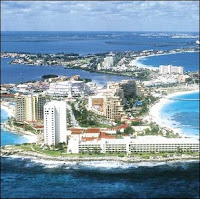Margarita Mind is a dangerous disease and it afflicts American, Canadians and European real estate buyers equally and without mercy.
How do you catch it?It happens when you arrive in Mexico, checkbook in hand, with the hungry look of the besotted tourist that envisions a life hanging in a hammock on a white sand beach in front of your little dream cottage.
How do you know you have it?When you start saying things like: “I met this guy in a bar; he has a cute house he wants to show me.” Or: “My friends say there are ways around the Mexican real estate laws”. And here is a real danger sign: “But I LOVE the house…I don’t care about the problems with the title or water or beach rights.” If you recognize these symptoms early enough, you can save yourself a lot of money or heartache.

Margarita mind can be fatal; I am not making this up; a financially comfortable American hired an English-speaking builder to build his dream home on the beach with its own water treatment, desalination plant, satellite Internet systems and a to-die-for view One small problem, the builder put the house on the wrong lot! The neighbor was very appreciative of the American for so beautifully improving his property. A proper survey using GPS points would have saved the day.
If you recognize these symptoms early enough, you can save yourself.
Here’s how:Stop! Think! And answer this question: would you enter into a real estate transaction in the old country without all of the facts, without a survey or appraisal, without a written contract, without double checking the rules? Of course you wouldn’t! So why do it in a foreign country where your government has no ability to right any wrongs?
Real estate laws in Mexico are not very different from in the U.S., Canada or Europe. However, real estate agents in Mexico are not licensed. And while the vast majority are honest ethical people, the few predators are the ones you need to be wary of.
Mexico wants and actively seeks the foreign investment dollar (or Euro) and the government has put practices and systems in place to help and protect the foreign real estate buyer. In the “restricted Zones of Mexico,” 100 miles from a border or 50 miles from a coast, foreign buyers obtain their properties in a fideicomiso (feeday co meeso). The fideicomiso closely resembles a living trust and gives the foreigner peace of mind, clean title and the right to sell, bequeath, mortgage and improve the property. And it has a 50 year life that can be renewed ad infinitum in 50 year chunks.
Closing costs and fees are significantly higher in Mexico than in the U.S. and Canada, lower then in France though. Many buyers, taking the advice of uninformed friends or misguided agents make foolish decisions in order to save a few thousand dollars upfront.
My cardinal rule for buyers is to “Do it right the first time, pay the proper fees now, or pay BIG time later when you sell or are caught in a routine audit.”
And with the advent of American style long-term mortgages and the safety requirements built into the mortgage industry (well, down in Mexico, anyway) it is safe and sensible for foreigners to use a mortgage. Not only are foreigners able to obtain significant financing needs for their Mexican dream home, but securing a mortgage, using a well-reputable cross-border mortgage lender, ensures that your close is legal and done properly.

Content provided by
Conficasa Mortgage International, a pioneering provider of cross-border financing of Mexican properties for Americans and Canadian dreamers, with more than 10 years of experience, ensuring a smooth lending and closing process throughout all stages of the complex cross-border financing process. The U.S.-based company has offices in Houston and Chicago and maintains close partnerships in Mexico resort areas. For more information, contact (281) 598-7060.
More:Conficasa International Real Estate Official SiteRiviera Maya Hotels Airport TransportationTours & ActivitiesRiviera Maya Guidebook









